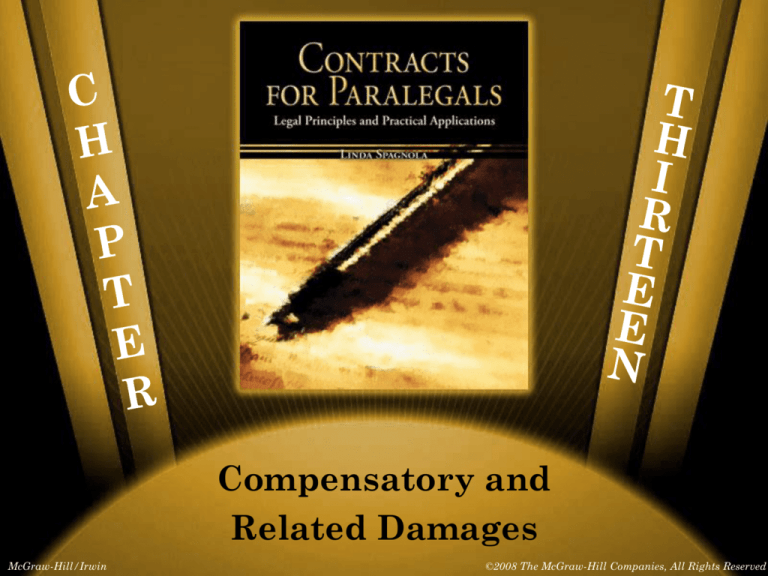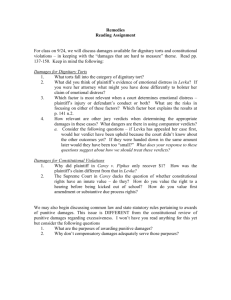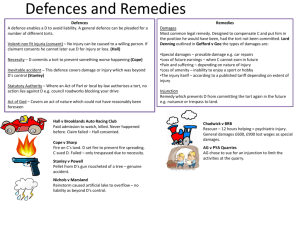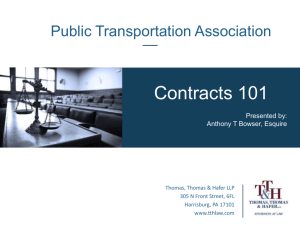
Compensatory and
Related Damages
McGraw-Hill/Irwin
©2008 The McGraw-Hill Companies, All Rights Reserved
Objectives
Chapter Objectives:
• Use vocabulary regarding damages properly
• Differentiate among the different types of
damages and explain the basis for their award
• Evaluate the plaintiff’s expectation,
restitutionary, and reliance damages
• Identify the kinds of damages that courts do not
generally enforce
13-2
Objectives
Chapter Objectives:
• Calculate the proper measure of damages in a
given fact pattern
• Discuss the necessity and means of mitigating
damages
• Determine when consequential and incidental
damages might be awarded
• Explain the difference between liquidated
damages and limited damages
13-3
Objectives
• This chapter will examine WHAT kinds of
monetary damages parties to a lawsuit can
expect and,
• HOW to calculate the appropriate damages
13-4
Damages
• The law categorizes the kinds of damages
available to plaintiffs based on their source
• Damages can be
1. Compensatory
2. Consequential
3. Incidental
4. Nominal
5. Liquid
6. Limited
13-5
Damages Not Recoverable
Under Contract Law
• There are two kinds of damages that are
never recoverable under contract law:
1. Speculative
2. Punitive
13-6
Damages Not Recoverable
Under Contract Law
• Speculative damages
– Harm incurred by the nonbreaching party
that is not susceptible to valuation or
determination with any reasonable
certainty
– The act must have first been proven to
have caused damage and then a party can
estimate the amount of damages that
could be awarded
13-7
Damages Not Recoverable
Under Contract Law
• Punitive damages
– An amount of money awarded to a
nonbreaching party that is not based on
the actual losses incurred by that party,
but as a punishment to the breaching
party for the commission of an
intentional wrong
13-8
Damages Not Recoverable
Under Contract Law
• Deterrent effect
– The authority to assess excessive fines
on a breaching party often can dissuade
a party from committing an act that
would subject him to these punitive
damages
13-9
Damages Not Recoverable
Under Contract Law
•
Statutory authority
– The legislature of a jurisdiction may
codify certain actions as subject to
punitive damages if they occur in
conjunction with a contractual breach
13-10
Damages Not Recoverable
Under Contract Law
• Tortious
– A private civil wrong committed by one
person as against another that the law
considers to be punishable
– The court may award punitive damages
based on the intentional or negligent
commission of the tort
13-11
Damages Not Recoverable
Under Contract Law
It is important to note that courts do not
grant punitive damages when the
plaintiff has no actual damages.
The plaintiff must show that he has
suffered harm before the court will
award compensation beyond contractual
remedies. In other words, nasty intent
alone is not justification for imposing a
monetary punishment. It must be on top
of actual harm incurred.
13-12
Calculation of
Compensatory Damages
•
Compensatory damages compensate for the
loss/harm incurred by the nonbreaching
party and attempt to put him in as good a
position as he would have been had the
contract not been breached
•
There are several kinds of compensatory
damages:
1. expectation damages
2. restitution damages
3. reliance damages
13-13
Calculation of
Compensatory Damages
• Expectation damages
−A monetary amount that makes up for
the losses incurred as a result of the
breach that puts the nonbreaching party
in as good a position as he would have
been had the contract been fully
performed
13-14
Calculation of
Compensatory Damages
• Restitution damages
– A monetary amount that requires the
breaching party to return any benefits
received under the contract to the
nonbreaching party to ensure that the
breaching party does not profit from the
breach
13-15
Calculation of
Compensatory Damages
• Reliance damages
– A monetary amount that “reimburses” the
nonbreaching party for expenses incurred
while preparing to perform her obligations
under the agreement but lost due to the
breach
13-16
Duty To Mitigate
• Duty
– A legal obligation that is required to be
performed
• Mitigate
– To lessen in intensity or amount
13-17
Duty To Mitigate
The nonbreaching party has a duty to try to
lessen the amount of harm suffered due to
the breach, thereby mitigating damages.
The aggrieved party must make a reasonable
effort to mitigate the damages caused by
the breach.
The reasonableness of the aggrieved party’s
efforts will be determined by the court.
13-18
Consequential and
Incidental Damages
• Consequential and incidental damages are
specific damages that go beyond
compensatory damages and are incurred by
the nonbreaching party after the breach
• The timing of the actions giving rise to the
damages is what distinguishes consequential
and incidental damages from reliance
damages
13-19
Consequential and
Incidental Damages
• Consequential damages
– Sustained by the nonbreaching party that
naturally and foreseeably flow from the
breach; they are a direct consequence of
the breach
• Incidental damages
– Damages resulting from the breach that
are related to the breach but not
necessarily directly foreseeable by the
breaching party
13-20
Nominal Damages
• Nominal damages
– A small amount of money given to the
nonbreaching party as a token award to
acknowledge the fact of the breach
13-21
Calculation of Damages
• V+E+L-M-R=D
Value + Expenses + Losses
- Mitigation - Received value
= Damages
13-22
Calculation of Damages
• V+E+L-M-R=D
– V - value of the promise in the contract
– E - any foreseeable out-of pocket expenses
– L - foreseeable losses due to the breach
– M - mitigation
– R - value of what nonbreaching party did
receive
– D - the potential compensatory damages
13-23
Liquidated Damages
•
Liquidated damages
– An amount of money agreed upon in the
original contract as a reasonable
estimation of the damages to be
recovered by the nonbreaching party
– A liquidated damages clause provides a
disincentive to breach the contract
13-24
Costs
•
American rule of attorney fees and costs
– Expenses incurred by the parties to
maintain or defend an action for the
breach of contract are generally not
recoverable as damages
13-25
Summary
• A plaintiff can recover different kinds of
damages all stemming from the same breach
of contract. Damages can be
1. Compensatory: Damages that put plaintiff in as
good a position as he would have been in had
breach not occurred. Damages can be based on
plaintiff ’s expectations, restitutionary principles,
and/or reliance
2. Consequential: Damages that arise from
naturally and foreseeably occurring events after
the breach
3. Incidental: Damages that arise from
unforeseeable but related events after the breach
13-26
Summary
•
A plaintiff can recover different kinds of
damages all stemming from the same breach
of contract. Damages can be
4. Nominal: A small sum of money awarded
in the event of a breach where no actual
damages have been sustained
5. Liquidated: A certain sum of money to be
awarded without the necessity of proving
actual damages
6. Limited: A “ceiling” that determines the
maximum amount of award for damages
13-27
Summary
• A plaintiff will never recover
1. Speculative damages
• Damages that cannot be determined or
calculated
2. Punitive damages
• absent statutory authority or the defendant’s
commission of an intentional tort
• Rarely, a plaintiff can recover attorney fees
and costs
13-28
Summary
•
A plaintiff must establish the amount of
damages he actually lost due to the breach
•
The general formula is V+E+L-M-R=D
•
This takes the nonbreaching party’s duty to
mitigate damages into account as well
13-29
Summary
•
In the sale of goods, the value of the contract
can be determined in three ways:
1. Market price - where no mitigation is
available
2. Cover - buyer is able to mitigate damages
by obtaining the goods from another
supplier
3. Resale - seller is able to mitigate
damages by selling the goods to another
purchaser
13-30








